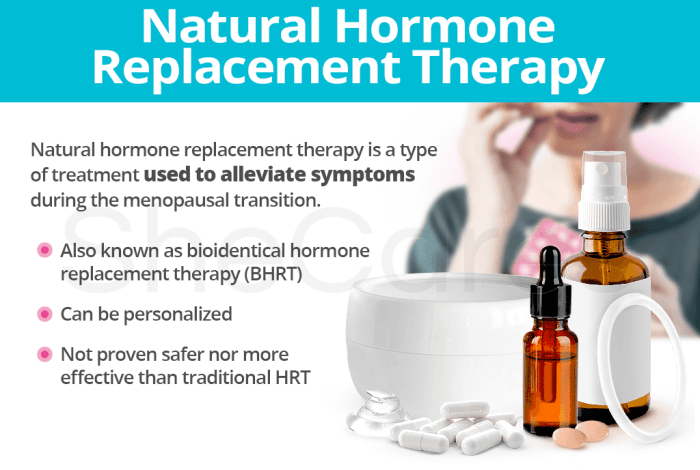Natural hormone replacement therapy (NHRT) has emerged as a promising approach to address hormonal imbalances, offering potential benefits for both women and men. By understanding the types, benefits, and risks associated with NHRT, individuals can make informed decisions about whether this treatment is right for them.
NHRT aims to restore hormonal balance by introducing natural hormones into the body, helping to alleviate symptoms associated with hormone decline. As we age, our bodies naturally produce less of certain hormones, which can lead to a range of health concerns.
NHRT can help to mitigate these effects, improving overall well-being and quality of life.
Natural Hormone Replacement Therapy (NHRT) Overview
Natural hormone replacement therapy (NHRT) is a treatment option for individuals experiencing symptoms related to hormonal imbalances, particularly during perimenopause and menopause. It involves replacing hormones that the body naturally produces but may decline with age or due to certain medical conditions.
NHRT aims to restore hormonal balance, alleviate symptoms, and improve overall well-being. It can help manage symptoms such as hot flashes, night sweats, vaginal dryness, mood swings, and sleep disturbances.
Types of NHRT
Various types of NHRT are available, each with its unique delivery method and dosage form. Common types include:
- Oral medications: Taken by mouth, these medications contain hormones that are absorbed into the bloodstream.
- Transdermal patches: These patches are applied to the skin and release hormones through the skin.
- Vaginal rings: These rings are inserted into the vagina and release hormones locally.
- Injections: Hormones are injected directly into the muscle or bloodstream.
- Creams and gels: Applied directly to the skin, these topical preparations deliver hormones locally.
History of NHRT
The use of hormone replacement therapy dates back to the early 20th century. In the 1940s, researchers discovered that estrogen could relieve menopausal symptoms. However, it was not until the 1960s that hormone replacement therapy became widely used.
In the 1990s, concerns emerged about the potential risks of hormone replacement therapy, particularly when combined estrogen and progestin were used. As a result, the use of hormone replacement therapy declined.
In recent years, there has been a renewed interest in hormone replacement therapy, particularly in natural hormone replacement therapy. NHRT uses hormones derived from plants or animals, which are believed to have a more favorable safety profile than synthetic hormones.
Benefits of NHRT

Natural hormone replacement therapy (NHRT) offers numerous potential benefits for both women and men. It aims to restore hormonal balance and alleviate symptoms associated with hormonal imbalances.
Benefits for Women
- Relief from menopausal symptoms:NHRT can effectively alleviate hot flashes, night sweats, mood swings, and vaginal dryness associated with menopause.
- Improved bone health:Estrogen, a hormone replaced in NHRT, plays a crucial role in maintaining bone density. NHRT can help prevent or slow down the progression of osteoporosis.
- Reduced risk of heart disease:Studies suggest that estrogen may have cardioprotective effects, reducing the risk of developing heart disease in women.
- Improved cognitive function:Estrogen has been linked to improved cognitive function and reduced risk of Alzheimer’s disease.
Benefits for Men
- Increased muscle mass and strength:Testosterone, a hormone replaced in NHRT, promotes muscle growth and strength.
- Improved libido and sexual function:Testosterone is essential for maintaining a healthy libido and erectile function.
- Reduced risk of osteoporosis:Testosterone also plays a role in bone health, helping to maintain bone density and reduce the risk of osteoporosis.
- Improved mood and energy levels:Testosterone can help improve mood, reduce fatigue, and increase energy levels.
Overall Health and Well-being
In addition to the specific benefits mentioned above, NHRT can also contribute to overall health and well-being. By restoring hormonal balance, it can improve sleep quality, reduce stress levels, and enhance mood.
Risks and Side Effects of NHRT

Natural hormone replacement therapy (NHRT) is generally considered safe, but like any medical treatment, it can have potential risks and side effects. These side effects are usually mild and go away within a few weeks or months. However, some women may experience more severe side effects that require medical attention.
The risks and side effects of NHRT vary depending on the type of hormone used, the dosage, and the individual woman’s health history. Some of the most common side effects include:
Risks and Side Effects
- Breast tenderness or swelling
- Nausea
- Headaches
- Mood swings
- Weight gain
- Vaginal bleeding
- Increased risk of blood clots
- Increased risk of stroke
- Increased risk of heart disease
In rare cases, NHRT can cause more serious side effects, such as liver damage or cancer. It is important to talk to your doctor about the risks and benefits of NHRT before starting treatment.
Minimizing Risks
There are a number of things you can do to minimize the risks associated with NHRT, including:
- Start with a low dose and gradually increase it as needed.
- Use the lowest effective dose for the shortest period of time.
- Choose a type of hormone that is right for you.
- Get regular checkups with your doctor to monitor your progress.
Who Should Not Use NHRT
NHRT is not right for everyone. Women who should not use NHRT include those who:
- Have a history of breast cancer
- Have a history of blood clots
- Have a history of stroke
- Have a history of heart disease
- Are pregnant or breastfeeding
If you are considering NHRT, talk to your doctor about the risks and benefits to see if it is right for you.
Types of NHRT
There are several different types of NHRT available, each with its own unique benefits and risks. The most common types of NHRT include:
Table 1: Comparison of NHRT Types
| Type | Dosage | Route of Administration | Potential Side Effects |
|---|---|---|---|
| Transdermal Patches | Varies depending on the patch | Applied to the skin | Skin irritation, allergic reactions |
| Gels | Varies depending on the gel | Applied to the skin | Skin irritation, allergic reactions |
| Creams | Varies depending on the cream | Applied to the skin | Skin irritation, allergic reactions |
| Pills | Varies depending on the pill | Taken orally | Nausea, vomiting, diarrhea |
| Injections | Varies depending on the injection | Injected into the muscle | Pain, bruising, infection |
How to Choose the Right NHRT

Selecting the appropriate NHRT regimen requires careful consideration of individual factors. Consulting with a qualified healthcare professional is crucial to determine the most suitable treatment plan.
Factors to Consider
- Symptoms: The type and severity of symptoms experienced will influence the choice of NHRT.
- Medical history: Pre-existing medical conditions, such as heart disease or cancer, may impact the suitability of certain NHRT options.
- Age: Age can affect the effectiveness and potential risks of NHRT.
- Lifestyle: Factors such as smoking, alcohol consumption, and exercise levels can influence the metabolism and efficacy of NHRT.
- Personal preferences: Some individuals may have specific preferences regarding the route of administration (e.g., oral, transdermal, or injection).
Consulting with a Healthcare Professional
Consulting with a healthcare professional is essential for choosing the right NHRT. They can provide personalized guidance based on individual needs and health status.
- Discuss symptoms and medical history.
- Review potential benefits and risks.
- Determine the most appropriate type and dosage of NHRT.
- Monitor progress and adjust treatment as needed.
Questions to Ask a Healthcare Professional, Natural hormone replacement therapy
- What are the different types of NHRT available?
- Which type of NHRT is most suitable for my symptoms and medical history?
- What are the potential benefits and risks of NHRT?
- How is NHRT administered?
- How long will it take for NHRT to work?
- What are the potential side effects of NHRT?
- How often should I be monitored while taking NHRT?
NHRT and Lifestyle
Lifestyle factors can significantly influence the effectiveness of NHRT. By adopting healthy habits, individuals can optimize the benefits of NHRT and improve their overall well-being.
Three key lifestyle factors that play a crucial role are diet, exercise, and stress management.
Diet
A balanced and nutritious diet supports the body’s natural hormone production and metabolism. Include plenty of fruits, vegetables, whole grains, and lean protein in your meals.
Limit processed foods, sugary drinks, and unhealthy fats, as they can interfere with hormone balance.
Exercise
Regular exercise promotes hormonal balance and improves overall health. Engage in at least 30 minutes of moderate-intensity exercise most days of the week.
Exercise helps reduce stress, boost energy levels, and regulate sleep patterns, all of which contribute to hormonal well-being.
Stress Management
Chronic stress can disrupt hormone production and lead to hormonal imbalances. Find healthy ways to manage stress, such as yoga, meditation, or spending time in nature.
Getting enough sleep and maintaining a healthy work-life balance are also essential for stress reduction.
Research and Evidence on NHRT
The research on the effectiveness and safety of NHRT is ongoing, with new studies being published regularly. Overall, the research suggests that NHRT can be an effective treatment for the symptoms of menopause, such as hot flashes, night sweats, and vaginal dryness.
However, it is important to note that the research is not without limitations.
One of the main limitations of the current research on NHRT is that most studies have been small and short-term. This makes it difficult to draw definitive conclusions about the long-term effectiveness and safety of NHRT. Additionally, many of the studies on NHRT have been funded by pharmaceutical companies, which raises concerns about potential bias in the results.
How to Stay Informed About New Developments in NHRT Research
There are several ways to stay informed about new developments in NHRT research. One way is to read scientific journals and attend medical conferences. Another way is to sign up for email alerts from organizations that focus on women’s health.
Finally, you can talk to your doctor about the latest research on NHRT.
Final Summary
The decision to undergo NHRT should be made in consultation with a healthcare professional. By carefully considering the individual’s needs, lifestyle, and medical history, healthcare providers can guide patients toward the most appropriate treatment options. NHRT can be an effective way to address hormonal imbalances, potentially improving physical, mental, and emotional health.
Essential FAQs
What are the potential benefits of NHRT for women?
NHRT can help alleviate symptoms of menopause, such as hot flashes, night sweats, vaginal dryness, and mood swings. It can also improve bone density, reduce the risk of heart disease, and protect against cognitive decline.
Are there any risks or side effects associated with NHRT?
Potential risks include blood clots, stroke, heart attack, and gallbladder disease. Side effects may include nausea, headaches, breast tenderness, and bloating. It is important to discuss these risks with a healthcare professional before starting NHRT.
How do I choose the right type of NHRT for me?
The type of NHRT that is right for you will depend on your individual needs and preferences. Factors to consider include the type of hormone imbalance, the desired route of administration, and the potential side effects. A healthcare professional can help you make the best choice.